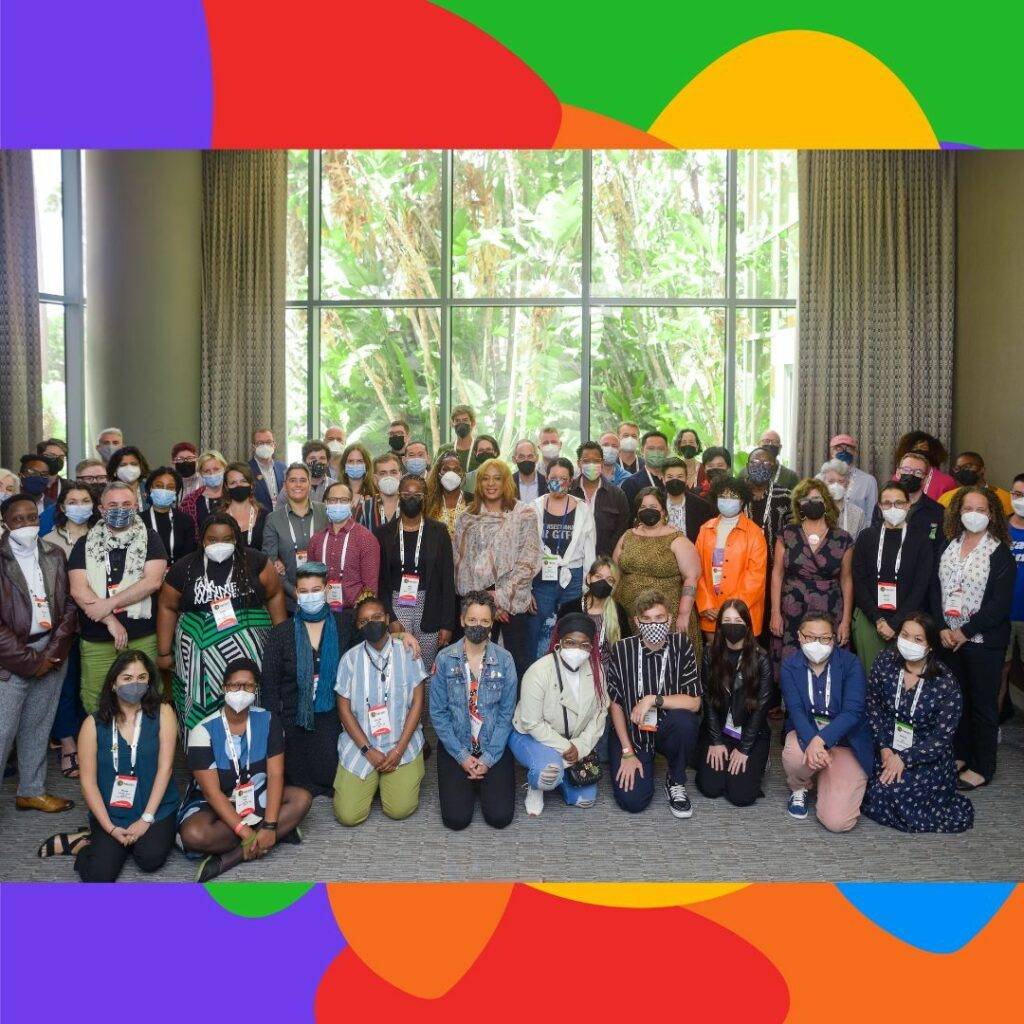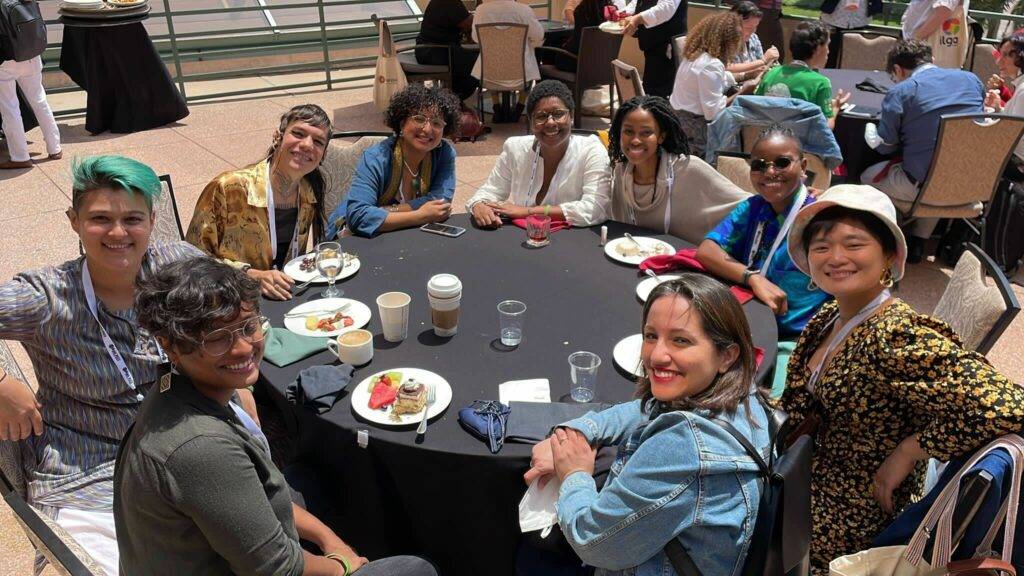History has proven that LGBTQIA+ youth across the globe have always found creative ways to resist, organize, thrive, and dream despite persistent marginalization, criminalization, and pathologization of their identities. If the past two years have shown us anything, it is that gender and sexually diverse youth will continue to step up and show brilliant examples of thoughtful leadership, necessary for sustaining our movements. FRIDA is a community of young feminists, based all over the world. Many of us come directly from these movements and self identify as queer, trans, intersex and nonbinary. Living and working through the pandemic for the past two years has meant finding creative means and ways of staying connected to each other through screens and distance. Adjusting to a reality of mostly virtual connection has emphasized that finding moments of solace to be in community with each other is critical in sustaining our momentum through such trying times.
The ILGA World Conference is the world’s largest gathering of global LGBTQI+ activists and changemakers, hosted by the International Lesbian, Gay, Bisexual, Trans, and Intersex Association, with 2022’s theme focusing on how LGBTQIA+ youth are harnessing their power to catalyze social justice movements. Still reeling from the impacts of Covid-19, the world has been adapting to a new way of in-person convenings and the ILGA World conference was the first gathering of its kind that we have had the opportunity to participate in since 2019. A wide cross-section of FRIDA staff had the opportunity to attend this recent ILGA World and the team was especially grateful to come together and share in this space.
As we celebrate LGBTQIA+ Pride Month 2022, we commemorate the ways in which sexually and gender-diverse people at the margins have fought for their freedoms and continue forging pathways to the equitable reality that we all deserve to flourish in. In commemoration of Pride, we share some key reflections on what participating in this conference meant for the FRIDA community and their dreams for the future of movements.
A note on participating interviewees:
Darcelle: Senior Communities & Culture Officer for Holistic Security & Community Convenings (Trinidad and Tobago)
Davina: Transition Program Officer and Latin America and The Caribbean Focal Point (Mexico)
Oumaima: Program Associate and Focal Point South West Asia North Africa (Morocco)
Paige Andrew: Program Co-Manager, Grantmaking & Operations (Trinidad & Tobago)
ILGA was the first in-person convening that we have collectively participated in since the pandemic began. What was the significance of being in this space for you? How did it feel to share physical space with LGBTQIA+ community, activists, and change-makers, after having only digital connections for the past 2 years?
Darcelle: “This space really made me feel grounded and affirmed in my work, for the first time in a long time. Meeting my coworkers and other people who are working around feminist activism and holistic security made me feel like my job and work are real and tangible; not just floating around on the internet. I don’t work directly with grantee partners, so I sometimes feel like my work is not significant but this space allowed me to be in the community and be reminded of why we do the work we do. It was a bittersweet movement because I felt a significant absence of people from my community. Over the last two years, many people died. I feel like my queer ancestors were there in spirit and really wanted me to remember them. I made my best efforts to remember and commemorate and hold space for them in this moment.”
“. I feel like my queer ancestors were there in spirit and really wanted me to remember them. I made my best efforts to remember and commemorate and hold space for them in this moment.”
Davina: “Attending the conference was both amazing and challenging. I loved being able to physically meet some of my peers. It was definitely one of the most awaited things for me: to be able to connect in person with others from the LGBTIQ movements. I truly enjoyed learning about activists’ work from all around the world. I learned that it’s important for me to gradually adapt to be outgoing again, while maintaining solitude as something that keeps me grounded and focused instead of too dispersed.”
Paige: “For some of us at FRIDA, including myself, ILGA was the first time navigating a conference as a donor. As young feminist activists, many of us have been to convenings and spaces like ILGA as grantee partners. That, in addition to the sheer number of people at ILGA, post the pandemic isolation was super intimidating and anxiety-inducing. However, being in person with the folks I have been dreaming, working, laughing, co-creating, and disrupting alongside for more than a year was beautiful and a timely reminder of how grateful I am for community, and to work with folks who challenge, unapologetically disrupt traditional spaces and notions and show up authentically.”

The ILGA conference this year focused on recognizing the importance of holding space to acknowledge LGBTQIA+ youth. What role do you see funders like FRIDA playing in supporting LGBTQIA+ youth who are advancing social justice movements for our liberation? What’s being done right and what more can be done?
Darcelle: “Being in such a space made me contemplate why young people are not part of more donor spaces. Why are they being sidelined when it comes to decisions about how resources are moved? Donors want to know how they can better serve youth but the answer lies in employing more youth – in particular, LGBTQI+ and marginalized youth. International NGOs have a huge opportunity to open the door to these communities. Our lived experiences are so valid and will make a significant impact in donor spaces.”
“Youth can’t be tokenized, asked to sit on advisory boards at the last minute, or asked to be involved in projects for the sake of having someone young present. Funders have to be intentional and flexible.”
Davina: “Funders’ role should be not only channeling resources and advocating for social justice in support of groups at intersections of several marginalizations. It should provide flexible support that is understanding and responsive to the many challenges faced by young activists. Youth activists have turned their disenchantment with more traditional politics and activism into innovative ways of achieving collective change. Recognition of the most marginalized groups to include them is something that’s being done right but something that can be done to deepen this is the development of specific strategies for particular identities/marginalizations that acknowledge the specificity of each. Homogenizing them under big umbrellas can end up invisibilizing certain struggles. For instance, transmisogyny and intersexism do not work the same as homophobia, biphobia, or lesbophobia so particular strategies that acknowledge sex characteristics and gender identity are important to further inclusion beyond acronym-lengthening.”
Oumaima: “I think that FRIDA is going in the right direction and I think we we’re the only funders that are focused catalyzing the activism of youth from majority countries, while also being led by an entire community of feminist youth from majority countries. Representation is important in these spaces. We just need to continue what has already been started.”
Paige: “FRIDA is a young feminist fund led by young feminists and I think we need to see more of that in philanthropy – especially for funds working with young folks. Youth can’t be tokenized, asked to sit on advisory boards at the last minute, or asked to be involved in projects for the sake of having someone young present. Funders have to be intentional and flexible. If we’re funding LGBTQIA+ youth then we need to be responsive to their needs, contexts, and limitations and provide adequate support. One of the key ways to do this is to work directly with queer youth and ensure our systems, decisions, and funding strategies are responsive to their needs. Frankly, we also just need to hire more queer, trans and intersex youth!”

We live in a rapidly changing world where shifts in political and social realities have a major impact on those who are most vulnerable. This can often make it difficult to hold space for dreaming and imagining. As you reflect on your experience of sharing space with the community, what are some dreams for LGBTQIA+ people and movements?
Darcelle: “I hope for more safe spaces. Beyond a safety memo, what does feminist safety look like in praxis? As feminist communities, how are we working to shift cultures? As we reintegrate and readjust to in-person convenings and gatherings, we all need to ensure that people feel held and safe. Are we considering the emotional, psychological, and mental wellbeing of people emerging from a reclusive and mostly digital life?”
Davina: “I would like for LGBTIQ+ people to have spaces to connect beyond our activism and to acknowledge our lives holistically. It seems since a lot of us find a way of survival through activism, activism becomes a huge part of our lives, not only professionally but also personally. I envision connecting in acknowledgment of our activism but also in acknowledgment of the fact that in many contexts just the fact of being alive is an act of resistance. Our lives are filled with culture, music, art, makeup, fashion and so many other things that are unique to us and that cishet people wouldn’t precisely understand or connect with. I envision our activism to deepen in that regard so that we can bond further our activism as a collateral effect of sharing our specific culture in all the different regions. I would love to learn of trans and queer scenes and cultures in other places than the Global North to learn more about what other ways of resistance are out there that wouldn’t precisely fall under the category of activism.”
Oumaima: “My hope for the next few years is that our community will acquire more rights and fewer people will be criminalized because of their sexual orientation. I hope people will be able to dream freely without feeling oppressed by the system. Finally, I dream of a hopeful future for youth where they follow the legacy of resistance that the elders began.”